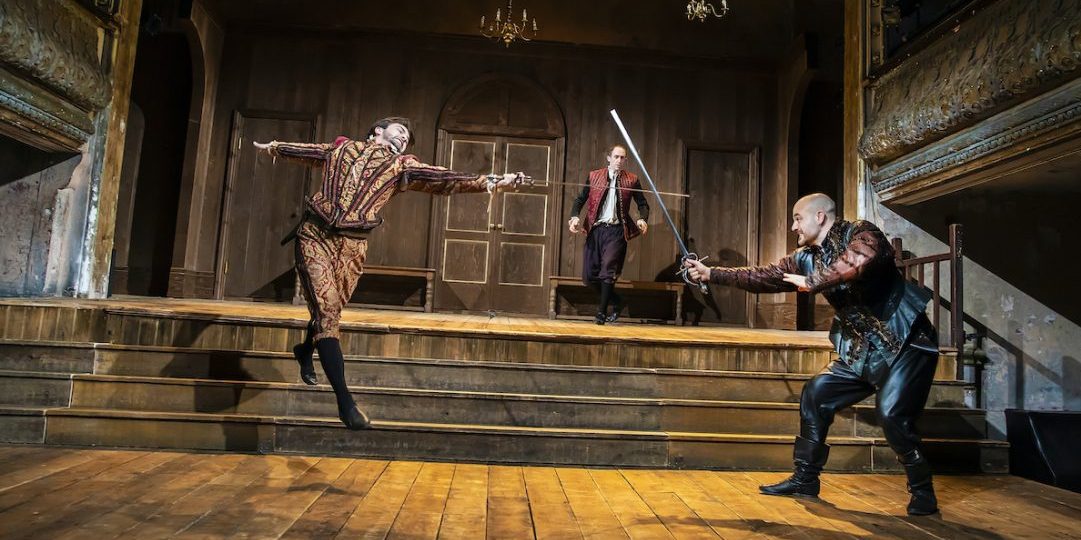This play should come as a real revelation to both the critic and the regular London theatregoer. We all think we know ‘Romeo and Juliet’ through and through; but in this superbly written play Rachel Garnet carefully and delicately interweaves Shakespeare’s text with verse and prose of her own to unveil a wholly new aspect – the relationship between Tybalt and Mercutio.
She works backwards from their fatal contest in Shakespeare’s original, a fight that had no really convincing rationale since neither was a true Montague or Capulet. From here she uncovers a love story emblematic of so many gay relationships erased or subsumed by history. They are presented as two very different men, but both in need of meaningful human connection. From the moment that flirtatious, hedonistic Mercutio plants a kiss on simmering Tybalt to distract him from Romeo’s pursuit of Juliet at the Capulet ball, we are treated to a fizzing display of wit and a searing exploration of emotional truth that manages to complement Shakespeare with rare skill. What Garnet achieves here is far more than mere pastiche (clever enough in itself). Instead, she uses and creates using Shakespeare’s forms freshly minted language and characterisations of rare power that are also fully accessible. There is a fine balance struck between modern sensibilities, sixteenth-century rhetorical conventions and crisp, clear language that is intoxicating to hear, especially when played so skilfully and feelingly by such a talented cast.
Conor Delves played Mercutio in the original American production before the pandemic and brings to the role all the quicksilver brilliance and intuitive pursuit of joy in the moment the role requires. Dressed in a blaze of gold and scarlet he exudes charm, cheek and – when needed – compassion. You can immediately see why both men and women fall in love with him, just as Shakespeare said. But underneath you also sense a restless unease and a desire for a stable anchor and a man to save and support.
Opposite him Tommy Sim’aan, dressed in darker hues, is the angry, repressed Tybalt. Likewise a recognisable (and contrasted) gay persona, he tries to find an escape from his troubled upbringing and his self-distaste in devoted service to the Capulet family and in conventional notions of order and austere self-discipline. He seeks to displace his sexuality in conventional definitions of public success. Part of the joy of the exchanges between them is that the merits of both approaches to life are fairly debated – Mercutio shows Tybalt that if he is to be a true ‘prince of cats’ then he needs to find his inner kitten; and Tybalt shows Mercutio that you cannot live wholly for today without planning carefully for tomorrow, especially in a society where even wealth does not buy you freedom to live an open same-sex life and love.
In other words, over and above scintillating humour and an affecting gay love story, this play manages to touch on some really big themes, whether about the merits of different ways of living a gay life, or the role of the church and other social institutions in policing personal choice, and the variety of ways in which social control can be exerted – even by those, such as the beggar Salvatore, who is technically outside respectability himself.
All of which brings me to the other characters in the play. In a truly remarkable series of cameos, Gethin Alderman had a very busy evening playing everyone else in Verona – ten or more characters in all. Whether impersonating Romeo, or Juliet, or Benvolio, or the Montague and Capulet patriarchs, or Friar Lawrence, or Count Paris he is effective and convincing, running the gamut of accents and using costume and body language and visual humour to find all the needed differentiation. Best of all, is his portrayal of a new character, Salvatore, an embittered, drunken beggar and father of Tybalt whose slumped, wheedling, sinister interventions provide an alternative counterpoint to the central dialogue. This is a ‘tour de force’ of improvisation worthy of the old repertory theatre tradition.
Despite these stellar individual performances this is a team effort and everyone on the creative team has clearly stepped up. Experienced director Philip Wilson ensures that the full stage and both levels of the stage at Wilton’s are used to good effect. Fight and intimacy director Haruka Kuroda summons convincing martial and amatory moments; while Ruari Murchison’s set has the simplicity and suggestions of period shabby-chic sufficient to let the imagination fill in the rest; and Harry Blake’s music, well sung by all the cast, hits the right Tudorbethan groove.
This show is quite simply the best experience I have had in a theatre for a very long time, and I cannot recommend it too highly.

